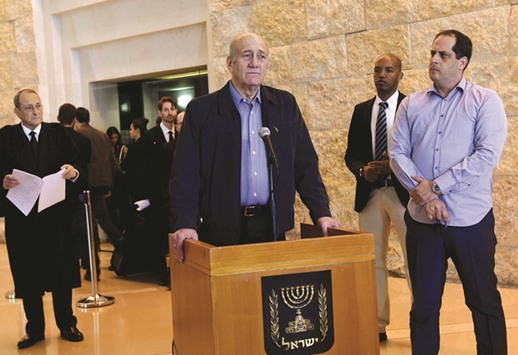
Former prime minister Ehud Olmert speaks to the media after a hearing at the Supreme Court in Jerusalem yesterday.
Israel’s top court slashed former prime minister Ehud Olmert’s prison sentence to 18 months from six years yesterday after overturning the main count in his 2014 bribery conviction.
Olmert, 70, will begin serving his term on February 15, according to live reports from the Jerusalem courtroom, making him the first former head of government in Israel to go to prison.
The charges related to his 1992-2003 term as Jerusalem’s mayor and real estate deals in the city.
The conviction ended speculation that Olmert - a centrist credited with working towards a peace settlement with the Palestinians until the graft scandal forced him to step down - might return to political life.
The Kadima party he formerly headed is no longer in parliament.
Olmert, prime minister from 2006 to 2009, has denied any wrongdoing in a major property deal that led to the construction of the hilltop Holyland apartment towers, a hulking stone complex widely seen as one of Jerusalem’s worst eyesores.
“A large weight has been lifted from my heart with the Supreme Court deciding to acquit me of the main charge in the Holyland affair,” Olmert told reporters after the Supreme Court ruling.
“No bribe was ever offered to me and I never accepted one,” said Olmert, who wore an open-neck blue shirt and looked visibly relieved. “But I respect the verdict of the Supreme Court justices.”
Tel Aviv District Court found Olmert guilty in March 2014 of two bribery charges, finding that he accepted 500,000 shekels (($128,500) from developers of the Holyland project and 60,000 shekels in a separate real estate deal.
The six-year sentence handed down by the lower court had been put on hold until the culmination of the appeal.
Issuing its ruling, a five-member Supreme Court panel said it had not been proven beyond reasonable doubt that Olmert had solicited the 500,000 shekels from a real estate developer, to help the veteran politician’s brother get out of debt. It upheld his conviction on accepting the smaller amount.
While critics say he is one of many politicians who gave preference to his own enrichment and personal interests over that of the public, supporters charge that hardliners opposed to his peace moves with the Palestinians had deliberately sought to topple him.
“Something important happened in Israel today. A former prime minister will go to jail, convicted of one of the most serious offences in our penal code, of bribery,” said prosecution attorney Yaron Golomb.
“Even though the sum is smaller, this is still a bribery conviction of 60,000 shekels.”
He quoted Supreme Court Judge Neal Hendel as saying: “The day that a person who held the highest position in the country goes to jail will be a dark day. The public feels like a child betrayed by those elected to lead and serve as a personal example.”
The court also issued rulings on the appeals of seven other men sentenced last year, including former Jerusalem mayor Uri Lupolianski, whose six-year sentence for bribery was converted to six months of community service due to his poor health.
Isaac Herzog, head of the opposition Labour party, said the ruling “proved that nobody, not even a prime minister, is above the law.”
“May this serve a lesson to public figures - never use the power given to us... for personal gains,” he said in remarks relayed by a spokesman.
A lawyer by profession, Olmert began his political career in the 1970s as a lawmaker who targeted organised crime in Israel. As the country’s leader, Olmert waged war against militants in Lebanon in 2006 and the Gaza Strip in 2008.
He claimed significant progress in talks with the Palestinians aimed at security a final peace deal, offering an Israeli withdrawal from much of the occupied West Bank. But no agreement was reached.
Olmert is expected to serve his term, separated off from most other prisoners, in the same jail holding former Israeli president Moshe Katzav. Katzav was convicted of rape charges in 2010 and sentenced to seven years.
